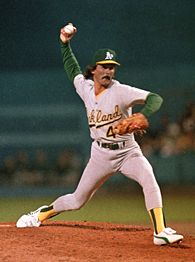Jay McGwire, the estranged brother of Mark McGwire, is claiming in a new book proposal that he introduced and injected the former baseball star with steroids.
In the proposal, first reported Wednesday on Deadspin.com, Jay McGwire alleges that Mark used Deca-Durabolin and that he introduced Mark to performance-enhancing drugs in 1994.
Jay McGwire writes in his proposal that his brother “began to use, but in low dosages so he wouldn’t lift his way out of baseball. Deca-Durabolin helped with his joint problems and recovery, while growth hormone helped his strength, making him leaner in the process. I became the first person to inject him, like most first-timers he couldn’t plunge in the needle himself. Later a girlfriend injected him.”
Jose Canseco, in a book he wrote in 2005, claims he and McGwire, former Oakland A’s teammates, used performance-enhancing drugs as far back as 1988. Jay McGwire disputes that in the book proposal.
The McGwire brothers reportedly haven’t spoken to each other for years.
Jay McGwire claims in the proposal that Mark McGwire used androstenedione in 1998 to allow Mark “to avoid all the potential adverse side effects that could occur from using anabolic steroids, such as water retention, hair loss, and liver, heart, or kidney stress. In addition, he wouldn’t have cholesterol problems or testicular atrophy. And there were no problems with the law.”
Jay McGwire, in the proposal, also says he wished his brother would have confessed at the famous congressional hearing, instead of saying he wasn’t going to talk about the past. Jay McGwire also writes that he doesn’t believe missing out on the Hall of Fame will affect his brother.
“Mark is a man I think most would like to forgive because his reason wasn’t nefarious — it was for survival,” he wrote, according to the proposal. “My bringing the truth to surface about Mark is out of love. I want Mark to live in truth to see the light, to come to repentance so he can live in freedom — which is the only way to live.”
Ah, so Jay’s book is “out of love” for his brother Mark…the same brother he’s using to get his 15 minutes of fame and a quick buck, and the one who he hasn’t talked to in years. Got it.
If Jay introduced and injected Mark with steroids, then he should have evidence of doing so. If he doesn’t, then I don’t know why anyone should believe a word this clown says.

